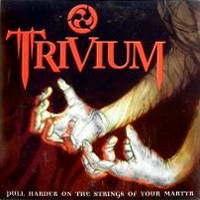Trivium’s second album, 2005’s Ascendancy, was the one that introduced them to the world. And spearheading it was Pull Harder On The Strings Of Your Martyr, a track that would become one of the greatest metal anthems of the decade. Frontman Matt Heafy looks back on the track that built Trivium.

It was written telepathically
“I remember writing that riff when I was still living at my parents’ house when I was about 17. I was sitting with the guitar on my couch, kind of sitting backwards facing the wall. I started strumming that intro riff, and at band practice the next day I said to Travis [Smith, former Trivium drummer] that I wanted to play him this part. He said, ‘Well, that’s funny. I have this drum part in my head I wanted to show you.’ And so we agreed to play the parts that we had come up with at the same time the night before to each other there and then, he counts in four, and it just fit. That’s how we came up with the beginning of the song.”
Machine Head’s road crew knew what it needed
“We were out on the Roadrunner Roadrage Tour with Machine Head and Chimaira, and we were playing the song a lot, but it had a completely different chorus and bridge. One night a Machine Head guitar tech pulled us to one side and said, ‘If this had a better chorus then this could be a really good single.’ We were like, ‘What’s he talking about? This song is great!’ but it’s exactly what [producer] Jason Suecof said to us when we went in to record. So we sat down and jammed it, and came up with a completely new chorus that we’ve used ever since… I’ve seen that guy since and I haven’t mentioned it to him, but I will do now!”

The lyrics are a metaphor for oppression
“The lyrics are about a tyrannical dictator, and it can be applied to anything – the things that happen in your life, or the things that you see around you in society, it can be about present times or ancient times. It’s not quite first person perspective, more like a third person that has to suffer at the hands of a dictator. That could be a person, a gang, an army. It’s trying to tackle what I think is the curse of modern mankind – that we allow these people to do these evil things to so many people.”
It’s got a little bit of everything
“We were the right age to soak up all of this great music – metal, metalcore, emo, punk, melodic death metal. And the song has bits of all of that – melodic vocals, metal riffing, that kinda open-stringed Roots-y riff that Sepultura, Machine Head and Slipknot were famous for. Which is quite different for us. So it could get kids into so many different styles of music.”
We didn’t realise we had an anthem on our hands
“The record company were telling us that this would be the first single, and of course I remember doing that Download show and the crowd singing about 25% of the lyrics without me, but we didn’t know why it was that song that resonated. It didn’t even have the title in the chorus! We thought Dying In Your Arms would be the big smash. But it always got the biggest reaction, and it remained that way until In Waves came out. Only that song gets more of a reaction than Pull Harder…, even today.”
To know it inspired people to form bands still amazes us
“It was a really important time for metal, and when I speak to people like Austin Dickinson from As Lions and he tells me he wanted to start a band because of seeing us at that time… it’s the most incredible feeling. And I look at the bands that are coming out of the UK right now, like Architects, Bring Me The Horizon and Bury Tomorrow, that are so amazing, and I think of our relationship with the UK. To think that we played a part in inspiring those bands is really incredible.”

